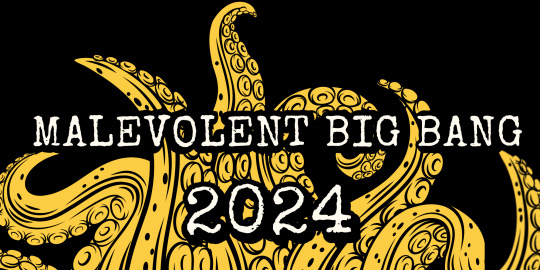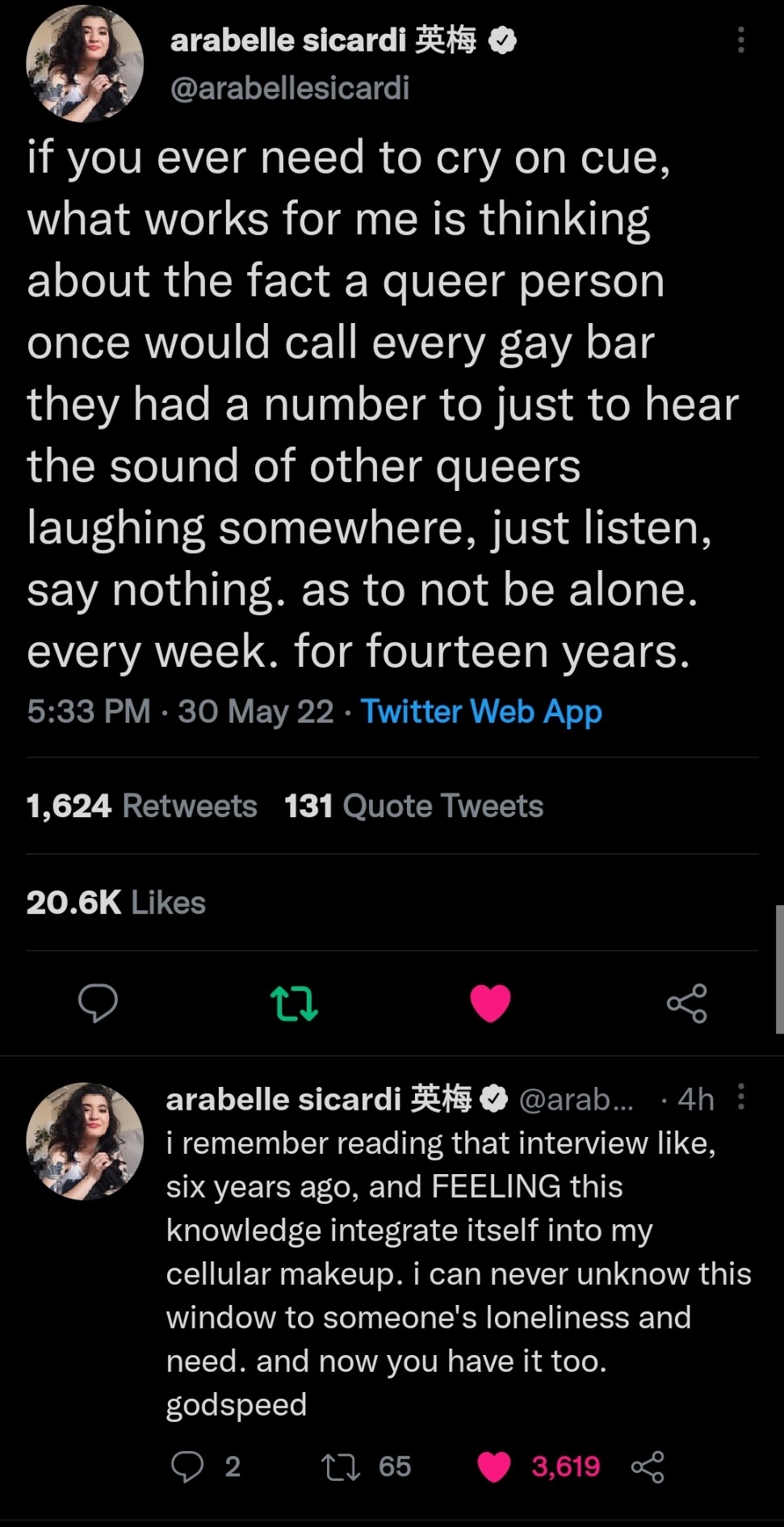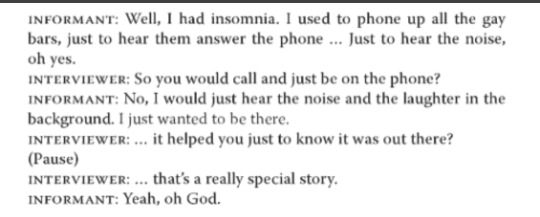Text
Malevolent Big Bang 2024

[ID: A banner with a black background and yellow octopus tentacles coming up from the bottom of it. On top of the tentacles are the words "Malevolent Big Bang 2024" in a white typewriter font with a black shadow outline. /End ID]
Hello all! The mod team would like to formally announce that we will be hosting the Malevolent Big Bang again this year, 2024! We're so excited to work with you all again and look forward to seeing both old and new faces 💜 Many of the rules and guidelines will remain the same this year, though we will be making some small changes that will be announced closer to signups.
Speaking of signups, here are the dates you should mark down if you are interested in participating in this event as a writer, beta, artist, or pinch hitter!
Writer signups open on May 5
Beta signups open on May 5
Artist signups open on July 13
Pinch hitter signups open on July 13
Keep an eye on this space as we get closer to those dates for more information, and feel free in the meantime to check our our FAQ and rules from last year if you'd like to get a feel for how this event will work! If you have any questions, feel free to send us an ask and we'll be happy to answer them.
161 notes
·
View notes
Text
never thought I’d find myself retrospectively wishing my puberty had additional lore but here we are
29K notes
·
View notes
Text
let me guess your worst personality trait based on your taste in movies and tv shows
#control freak#THANK U OP FOR THE MR ROBOT REPRESENTATION#instantly made my day better. man. i miss mr robot
44K notes
·
View notes
Text
Music fans reblog this with an album you consider “your” album… one that is part of your personality, one that means a lot to you, or just one you really like… Mine is The Perfect Shade of Green by Skittish :>
47K notes
·
View notes
Text
Writer/Beta Signups Open!

We are excited to announce that Writer and Beta signups are open for the Malevolent Big Bang 2023!
Before filling out the signup form below, please review our rules and schedule to ensure that you are able to meet the event requirements. (For reference: this is an 18+ event where writers are asked to complete the first draft of a fanfiction at least 5,000 words long over a two-month period.) If you have any questions, refer to the FAQ or send the mods an ask for further clarification!
The writer signup form will remain open until 11:59 PM EST May 21st.
The beta signup form will remain open until 11:59 PM EST July 31st.
If you are interested in participating as both a writer and a beta reader, please fill out both forms.
Once you submit your signup form, you will be sent an email with an invitation to the event Discord server within 24 hours. We ask that all participants join the server, as most event communication will be facilitated through Discord. If you do not receive an email, please send us an ask or email [email protected].
The mod team is is so excited to kick off this event with you!
WRITER SIGN-UP GOOGLE FORM
BETA SIGN-UP GOOGLE FORM
67 notes
·
View notes
Text
I should start offering my services for hire to not-very-online creators whose works suddenly pick up big transformative fandoms. no, don't answer that headcanon question with a definitive yes or no, keep it in the "it's not in the text so who knows" zone. here's a list of loaded terms that people will use to try and bait you into shipping discourse without your knowledge. no yeah, that's a perfectly harmless personal taste thing but if you share it publicly people will think you're calling for book burning. there's actually no need to respond to this one critique, a very similar discourse in was settled in a 47k note post about avatar: the last airbender in november 2020, the argument will inevitably go the same way.
#I hate that when i saw this my first thought was 'oh no did harlan kick That specific hornet's nest'#and then i went into the tag and discovered that he did in fact kick That specific hornet's nest#what I would give to be less online...
9K notes
·
View notes
Text
It’s PRIDE MONTH and wanting to start with this little remembrance from queer people in the past.


98K notes
·
View notes
Photo

More Jojo Malevolent nonsense xD
713 notes
·
View notes
Text
why did they make me feel emotions about shivtom faildivorce is it because they invented a kind of reverse psychology pathetic limp insipid sorry son of a bitch sweatshop-made love that is so far removed from love but it is still even in all it's pitiable wretchedness recognizable as such. fucked up if true
443 notes
·
View notes
Text
mondale forgot your scent

#sorry to the 90 percent of my followers who could not give a rats ass about succession#but we are on#succession#lockdown
408 notes
·
View notes
Text
HAPPY SHOULD I GO? OR ARE YOU GONNA GO? I’M TIRED BUT YOU CAN STAY THERE IF YOU’D LIKE SUNDAY TO ALL WHO CELEBRATE
2 notes
·
View notes
Text

35 notes
·
View notes
Text









the bed song, amanda palmer // succession s04e01 “the munsters”
0 notes
Text
61K notes
·
View notes
Note
Can you talk more about the history of the language and storytelling techniques/conventions of audio dramas? That's an incredibly intriguing concept but I wouldn't have the first idea where to look for more info about it. It reminds me a lot of the idea of video game literacy and how a lot of games aren't accessible to people who are brand new to video games because there are so many established conventions that aren't explained to new players
It has taken me nearly a month to reply to this, which I know is in reply to this post, and I am sorry for that! But also, yes!!!!! Hell yes, yes, I see exactly what you mean about the video game stuff.
Unfortunately I think there’s not much out there already written about the developing conventions of the new wave of audio drama. In large part, I think, because coverage of new audio fiction from outside the community has been so notoriously poor. But maybe also partly because there seems to be a strangely negative take on classic radio drama from a lot of the US sector within that community? Which I think really comes down to exactly the things I was talking about – Old radio drama feels wrong to a lot of people now, because its storytelling language just doesn’t exist in our culture the way it once did; and even fewer people are familiar with late-20th-century American audio fiction like ZBS that might feel more comfortable or closer to other present-day mass media storytelling techniques. I see it claimed sometimes that there’s something inherently unsophisticated about old time radio storytelling, which is just flat out untrue, and I would highly encourage anyone who’s wondering to check out something like the “Home Surgery” episode of Gunsmoke or “The Thing on the Fourble Board” from Quiet, Please to see just how effective and well-done a lot of those old shows were.
(Leaving the UK out of this, because audio fiction stayed way more prominent there and I do not think the same problems exist, and leaving everywhere else out because unfortunately I just don’t know enough about how the medium fared elsewhere, or how it’s doing now. Alas.)
I’ve been thinking lately about parallels to this in other media that I have been able to study and read other people’s writing on, and I think a good comparison is possibly novels? The western “novel” as we think of it is really something that didn’t exist at all until about the 18th century (there are earlier works that have been kind of retroactively labeled ‘novels,’ some of them centuries earlier, but even if they have the characteristics of what we now call a novel, they’re very much disconnected from the evolution of the novel as something we have a name and a definition for). There are no novels from the medieval period, from the Renaissance. There are books as long as novels, but they’re not novels.
The thing is, when you read 18th and even 19th century novels, it shows, because the techniques for telling a story in that form hadn’t been really figured out yet. What you get is a lot of meandering, episodic doorstoppers, some of which have hundreds of pages before the main characters even enter the picture. A lot of writers at the time, and into the 19th century, actually hated the whole concept of novels. I think it’s a bit like going back and watching Monsters, Inc. and then watching Monsters University. The first one was revolutionary, yeah, and it’s a good movie still, but it’s not hard to see the visual difference between the two just in terms of the tools that the people making them had available to them. Before you can write a story or animate hundreds of thousands of individual hairs on one character, you have to figure out how.
One of the big, obvious things about novels from that period, though, is that many of them are first-person, and many are epistolary. It’s hard to find one that isn’t supposedly a memoir or a journal or a set of letters. The third-person perspective in long-form prose was something that had to be figured out; it didn’t just exist in the void, automatically summoned into existence the moment we started writing novels, which I think is really fascinating. There’s a lot of work in those early novels that’s being put into explaining why, and how, and to whom the story is being told. Because otherwise, how does it make sense that the book exists? It’s not a poem, or a play; it’s not taking the form of a traditional story or myth, not attempting to be an epic. Those early novels were about contemporary, real-seeming people, so the writers and audiences wanted an explanation for how the story had been recorded that relied on other existing forms of writing – letters, journals, memoirs, sometimes claiming to be older texts that had been “found” (gothic novelists seemed to like this one). Sometimes the narrative voice is just the author using first person to actively tell you the story. They hadn’t yet bought into the presumption that we take for granted now, that a novel can have a voice that knows everything, without being the voice of any character in it.
And I think that it’s fascinating how similar that is to the heavy use of recording media as frame narrative in modern audio drama. It’s worth noting: classic radio drama doesn’t do this like we do now. By far, the standard for OTR is the same as the third-person omniscient perspective, the film camera; the storytelling presumes that you’re not going to need an explanation for how you’re hearing this. The audiences those shows were made for were used to fiction told solely in audio, in a way that a lot of modern audiences are not, and so that narrative leap of faith was kind of inherently presumed.
There’s also a way more common use of omniscient or internal narration in old radio drama that I feel like I mostly see now only in shows that are deliberately calling back to old styles and genres. A good example is The Penumbra; we hear Juno’s internal thoughts, just like so many of the noir-style detectives from the 40s and 50s I grew up listening to, and we never really ask why or how. (Except, of course, when the show pokes fun at this affectation, which I think really only works because it feels more like lampshading the stock character tropes of noir, as opposed to the actual audio storytelling technique it facilitates.) To take it further, there are some old radio shows like the sitcom Our Miss Brooks which go so far as to use an actual omniscient narrator to facilitate a lot of the scene transitions, but do so in a much more confident and comfortable way than modern shows like Bubble, where the narration reeks of “we’re making this audio drama in the hopes we can finally make the TV show, and we actually hate this medium and don’t know how to work in it, so rather than learning how to make what’s happening clear with just audio, we’re going to tell you what’s happening and then reference that we’re just telling you what’s happening.”
Bubble’s narration doesn’t work, because it’s actively pushing against the show, telling you things that sound design could have told you just as easily, sometimes actively acknowledging that the narration feels wrong instead of just not using narration. Our Miss Brooks is admittedly not one of my favorite old radio shows, but its use of narration is much smoother, because it’s written with a confidence that it’s only being used to clarify the the things that would be the absolute hardest to show with audio alone; confidence that they know how to tell everything else with sound. Internal narration from the likes of Juno Steel or Jack St. James or my favorite classic detective Johnny Dollar works because noir as a genre is inherently tied to the expressionist movement, where the (highly idiosyncratic) personality and worldview of the characters literally shapes how the world around them appears to the audience; it works to hear their thoughts, because we’re seeing the world through their eyes. We don’t have to know how they’re saying this to us, they just are.
None of which is at all to say that there’s anything inherently wrong with using framing devices! Actually the opposite, kind of. First of all, because I genuinely do think that it’s a sign that we are actively, at this moment learning how to tell these stories, and how to listen to them, which is just so, so exciting I don’t even have words to express it. And secondly, because as a person who loves thinking about stories and storytelling enough to write this kind of ridiculous essay, I am obsessed with metafiction. I’m a sucker for the likes of Archive 81, The Magnus Archives, Welcome to Night Vale, Station to Station, Greater Boston, Within the Wires. They’re stories that take the questions that framing devices are used to answer for writers and audiences who don’t feel comfortable not asking them – Why is this story being told? Who is telling it? Who is it being told to? – and use those questions to the full advantage of the story, exploring character, creating beautifully effective horror, creating a bond with the listener. (Hell, one of the admittedly many things that Midnight Radio was about for me was exploring how much value and comfort I have found in listening to stories that acknowledged I was listening to them.) I think, though, that not all stories necessarily are their best selves when they feel like they have to address those questions, and as fiction podcasts become a bit more mainstream I’m really hoping that writers will feel more comfortable in trusting the audience to suspend that disbelief, and that audiences will feel more comfortable doing it, and that framing devices will be less unjustly maligned.
Of course, all of that is focused on writing techniques, and I think that’s because I’m a writer who has studied writing! I know very little concretely about the part of audio storytelling that relies on sound design, so while I have a definite feeling that classic and modern audio fiction is using different sound design languages, or that the audio language of British audio drama (where there’s much more continuity in the history of the medium) is different from audio fiction from elsewhere, that’s a lot harder for me to put into words like this. It’s something I would desperately love to see explored by someone who did know that field intimately, though.
240 notes
·
View notes

